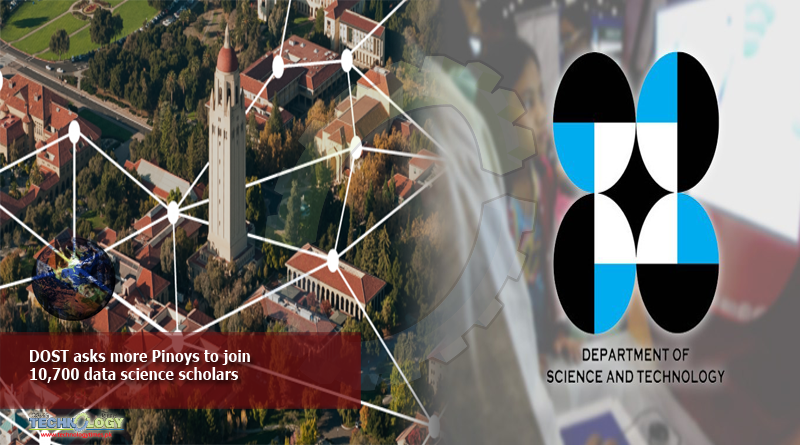The Department of Science and Technology (DOST) is encouraging qualified Filipinos to maximize their time at home amid the Covid-19 pandemic by enrolling in an online training under the project, Smarter Philippines through Data Analytics Research and Development, Training and Adoption or Project SPARTA.

The trainings may be attended free of charge through scholarships made available under the project, according to DOST’s Philippine Council for Industry, Energy and Emerging Technology Research and Development (PCIEERD)
“It is our goal to upskill 30,000 Filipinos who will be capable to handle big data generated by the different government agencies as well as other entities in the country. We put weight on this initiative as we believe that data science can ultimately change and boost government processes, for the benefit of each Filipino; and even solve some of our country’s major problems,” said DOST-PCIEERD executive director Enrico Paringit.
In partnership with the Development Academy of the Philippines (DAP), Analytics Association of the Philippines (AAP), and Coursebank, Project SPARTA offers free online education to equip interested individuals with essential data science and analytics knowledge and skills to efficiently manage, analyze and interpret data.
Project SPARTA is open to all Filipinos permanently based in the country, who are at least senior high school graduates, with or without prior knowledge on data science and analytics
Scholars may pursue one of these learning pathways:
Data Associate – They gather, process, and analyze data and prepares reports that highlight relevant trends and other significant results. Moreover, they provide some information on observable trends and patterns that help senior analysts and managers easily identify opportunities for follow-up in-depth analysis.
Data Steward — They are responsible for ensuring that an organization’s data is well-defined, managed, and ready to use for downstream reporting, analytics, modeling, or even artificial intelligence (AI) use cases. Essentially, they are the gatekeepers of data, working to improve data quality; ensure data acquisition, usage, maintenance, access, and security, in compliance with policies, rules, regulations, and ethical practice.
Data Engineer — They are the builders and managers of data workflows, pipelines, ETL processes, and platforms and are mainly responsible for the management of the entire data lifecycle: ingestion, processing, surfacing, and storage.
Data Analyst – They leverage reporting, data analysis, and modelling techniques to solve problems and gather insight across functional domains. They also analyze data and assess requirement from a business perspective related to an organization’s overall system.
Data Scientist — They are specialists who apply their expertise in statistics and building machine learning models, enriched with programming, to make predictions and answer key business questions. Data scientists create sophisticated analytical models used to build new datasets and derive new insights for data.
Analytics Manager — They oversee analytical operations and communicate insights to executives. Analytics managers translate analytical results to actionable business items. Their role is to drive business outcomes, bridging technical expertise from steward, engineer, scientist and analyst with the operational expertise of the business functions.
Each pathway can take about six months to finish, depending on the pace of the scholar. After completing one, another pathway can be pursued.
To date, there are already 10,700 scholars under Project SPARTA. Most number of scholars are ages 18-34 and are pursuing the Data Scientist and Data Associate pathways. In terms or percentage, 58% are working for private companies, 17% are from government agencies, and the rest are students and faculty members. Interestingly, 57% of the scholars are female.
“Filipinos can benefit from learning about data science in at least two ways: one, through the employment opportunities for our data scientists, and two, by harnessing their expertise in solving socio-economic problems at the national and local levels, as well as creating public and customer value through new products, improved services, and evidence-based policies,” said Dr. Alan Cajes, DAP senior executive fellow and Project SPARTA project leader.
Paringit supports Cajes’ statement by saying that “data science is like a swiss army knife that has multiple functions catching fraud and tax evasion detection, human and national security, street crime awareness, and resource management, all of which can help us improve the life of the Filipinos.”
“We’ve seen how data science tools have become indispensable in this period of the worldwide pandemic. Epidemiological analysis and disease surveillance are currently prime areas where data science had shown their mettle. However, as we transition to post-lockdown era, the global business community and governments are going to need skills that are able to make sense of what happened and present economic, business and industrial scenarios that can help us all move forward. Possessing data science skills are therefore crucial now, more than ever,” he added.
The Project SPARTA trainees are required to develop a capstone project to highlight the skills and knowledge learned throughout the courses. These projects can receive financial support from DOST-PCIEERD through the 2020 Call for Proposals under the Good Governance through Data Science and Decision Support System (GODDESS) Program. Interested trainees can submit their proposals at https://dpmis.dost.gov.ph/ until May 31, 2020.
This news was originally posted on newsbytes.com
